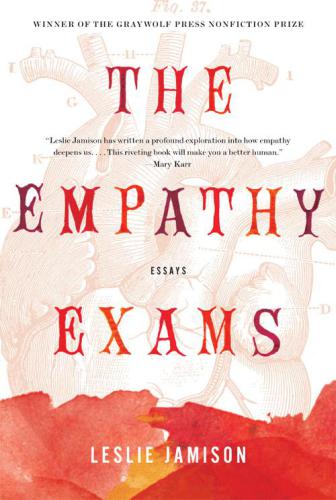
The Empathy Exams
Essays
کتاب های مرتبط
- اطلاعات
- نقد و بررسی
- دیدگاه کاربران
نقد و بررسی

Starred review from January 6, 2014
Novelist Jamison’s (The Gin Closet) first collection of essays, winner of the Graywolf Press Nonfiction Prize, is a heady and unsparing examination of pain and how it allows us to understand others, and ourselves. Whether she’s playacting symptoms for medical students as a medical actor, learning about the controversial Morgellons disease (delusional parasitosis), or following ultramarathoners through the rugged Tennessee mountains, Jamison is ever-probing and always sensitive. Reporting is never the point; instead, her observations of people, reality TV, music, film, and literature serve as a starting point for unconventional metaphysical inquiries into poverty tourism, prison time, random acts of violence, abortion, HBO’s Girls, bad romance, and stereotypes of the damaged woman artist. She focuses on physical and emotional wounds because, as she writes, “discomfort is the point. Friction arises from an asymmetry.” For Jamison, that friction shatters the clichés about suffering that create distance between people, resulting in a more honest—and empathetic—way of seeing. Agent: Jin Auh, Wylie Agency.

Starred review from May 15, 2014
A dazzling collection of essays on the human condition.In her nonfiction debut, the winner of the 2011 Graywolf Press Nonfiction Prize, Jamison (The Gin Closet, 2010) presents 11 essays that probe pain alongside analyses of its literal and literary trappings. Whether tackling societal woes such as strip mining, drug wars, disease and wrongful imprisonment, or slippery abstract constructs including metaphor, sentimentality, confession and "gendered woundedness," Jamison masterfully explores her incisive understanding of the modern condition. The author's self-conscious obsession with subjectivity and openness to the jarringly unfamiliar become significant themes. In the title essay, for example, the author uses her job as a medical actor-tasked with pretending to be a patient afflicted with a predetermined illness in the service of measuring medical students' diagnostic skills and bedside manners-as a springboard for examining the meaning of empathy and her relation to it. "Empathy comes from the Greek empatheia-em (into) and pathos (feeling)-a penetration, a kind of travel," she writes. "It suggests you enter another person's pain as you'd enter another country, through immigration and customs, border crossing by way of query: What grows where you are? What are the laws? What animals graze there?" Jamison's uncanny ease in crossing boundaries between the philosophical and the personal enables her both to isolate an interiority of feeling and capture it in accessible metaphorical turns of phrase: "Melodrama is something to binge on: cupcakes in the closet." Throughout, Jamison exhibits at once a journalist's courage to bear witness to acts and conditions that test human limits-incarceration, laboring in a silver mine, ultramarathoning, the loss of a child, devastating heartbreak, suffering from an unacknowledged illness-and a poet's skepticism at her own motives for doing so. It is this level of scrutiny that lends these provocative explorations both earthy authenticity and moving urgency.A fierce, razor-sharp, heartwarming nonfiction debut.
COPYRIGHT(2014) Kirkus Reviews, ALL RIGHTS RESERVED.

Starred review from April 15, 2014
Jamison ("The Gin Closet") notes that empathy is "a choice we make: to pay attention, to extend ourselves." In this collection of 11 essays, which take place in many different regions of the world including Central America, Bolivia, South Central Los Angeles, and Tennessee, the author does pay attention. She writes about a variety of subjects such as reality television, Tijuana, Frida Kahlo, ultra marathons, the West Memphis Three, illness, female suffering, and working as a medical actor, examining some very difficult topics with intelligent candor. The types of empathy--self, painful, guilt, fearful--evoked when reading the pieces are as varied as their subject matter. Jamison illustrates self-empathy, for example, when openly describing traumatic events in her personal life, including when she was violently mugged in Nicaragua; cleverly woven into the retelling of this painful and terrifying ordeal is Vladimir Propp's "Morphology of the Folktale". VERDICT Winner of the 2011 Graywolf Press Nonfiction Prize, these essays will inspire readers to reflect on their own feelings of empathy--not an easy feat in today's disinterested society. This provocative collection will appeal to many types of readers.--Erica Swenson Danowitz, Delaware Cty. Community Coll. Lib., Media, PA
Copyright 2014 Library Journal, LLC Used with permission.

Starred review from March 1, 2014
Jamison wrote about wounded women in her powerful novel, The Gin Closet (2010), and she pursues that subject in this collection of gutsy essays. But the line of inquiry that connects these riveting works of acute description and exacting moral calculus, these amalgams of memoir and risky investigative adventures is Jamison's attempt to discern and define empathy in diverse and dicey situations. She begins with an account of her experiences working as a medical actor, performing as patients with baffling ailments that medical students must diagnose, encounters that deliver the realization that empathy requires humility and imagination. She discloses her own medical travails and asks, When does empathy actually reinforce the pain it wants to console? Jamison's mission to put empathy to the test is more covert and even more provocative in her wrenching chronicles of drug-war-ravaged Mexico; Nicaragua, where a man attacks her and breaks her nose; a silver mine in Bolivia; and a Gang Tour in Los Angelesexplorations that inject guilt into the equation. A tough, intrepid, scouring observer and vigilant thinker, she generates startling and sparking extrapolations and analysis. On the prowl for truth and intimate with pain, Jamison carries forward the fierce and empathic essayistic tradition as practiced by writers she names as mentors, most resonantly James Agee and Joan Didion.(Reprinted with permission of Booklist, copyright 2014, American Library Association.)

























دیدگاه کاربران